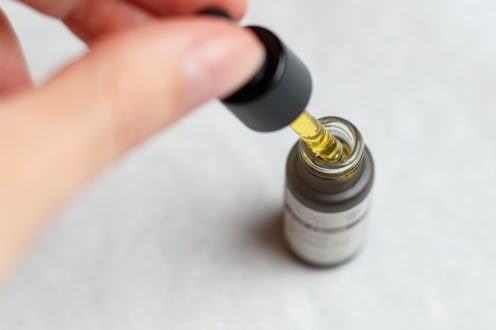Life
Over 50 People In Utah Got Sick From Fake CBD

A new report from the Centers for Disease Control and Prevention (CDC) says that fake CBD in Utah poisoned over 50 people this past winter. The CDC reported that 31 of the 52 people that were sickened by what they thought was CBD oil ended up in the emergency room, with symptoms ranging from confusion and hallucinations to seizures, loss of consciousness, and slurred speech, according to The Salt Lake Tribune.
Cannabis-derived CBD — aka, cannabidiol — has been getting lots of attention in recent months. Many folks claim it relieves anything from anxiety and depression, to chronic pain and even acne. Studies showing the benefits of properly sourced and administered CBD oil may be pretty significant, too — it's been recommended for use in the treatment of epilepsy by advisors to the FDA, and shows promise as a treatment for chronic pain, according to Medical News Today.
Gizmodo notes that, while while synthetic cannabinoids have been linked to instances of users getting sick in the past, those affected in Utah weren’t trying to buy synthetic marijuana — they thought there were buying genuine CBD oil that only contained cannabidiol, which is the non-psychoactive compound found in hemp. Many of the poisoned CBD oil users bought the fake CBD from established smoke shops, according to Gizmodo.
CBD oil is legal for restricted use in Utah, according to The Salt Lake Tribune, and is specifically prescribed for those with “uncontrolled” seizures. These patients must be diagnosed by a neurologist, and given Utah state-issued medical ID cards for the legal purchase of the hemp-derived oil. While CBD oil is legal in some states for recreational or over-the-counter purchase, it must be medically prescribed in Utah.
But since early last November, the Utah Poison Control Center (UPCC) has received numerous reports of patients getting sick after using the oil, The Salt Lake Tribune further reports, and according to Gizmodo, state and federal officials formed a task force after increasingly frequent reports of the fake CBD oil induced poisonings. Officials found at least 52 poisoning cases in-state — all reporting the same symptoms — between October 2017 and January 2018. Gizmodo also notes that, while CBD oil can have some side effects, like nausea, it doesn’t cause the kinds of reactions reported by the UPCC.
Gizmodo further reports that lab testing of the oil in question found no trace of CBD, but it did reveal the presence of a synthetic cannabinoid meant to mimic the effects of THC, the psychoactive compound in cannabis. Eight out of the nine products tested had no labels tracing the manufacturer or the ingredients of the oil. Four of the five tested patients were found to have the fake cannabinoid in their systems, as did an unopened jar of the same oil taken by the patients.
Roberta Horth, an officer with the CDC’s Epidemic Intelligence Service, told Gizmodo that synthetic cannabinoids act on the same brain receptors as THC, "but the effects of synthetic cannabinoids can be unpredictable and severe or even life-threatening.” She also said that the effects of synthetic cannabinoids can be more serious than the side effects of organic THC, and that "fatalities [...] have been reported in Europe.” Fortunately, there have been no fatalities in any of the reported Utah poisoning cases.
The sale of CBD is legal on a state by state basis, but it's still illegal on the federal level in all 50 states, according to The Brookings Institution. While purchasing CBD for prescribed medical use is legal in Utah, sales to the general public aren’t; yet, despite the legal concerns, CBD containing products can be found in smoke shops and health food stores, and for the most part, authorities have ignored the issue, the Standard-Examiner reports.
So while you might be excited to try CBD oil to check out its purported health benefits for yourself, it’s important to remember to source health supplements carefully — especially in cases where regulations may be lax or non-existent. Always check labels to make sure the ingredients are clearly marked — and before you by that CBD, check your state laws to make sure it's legal where you live.
Readers should note that the regulations and data surrounding marijuana, CBD, and other related products are still developing. As such, the information contained in this post should not be construed as medical or legal advice. Always consult with your doctor before trying any substance or supplement.